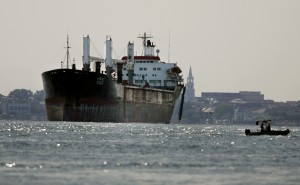
According to the Syrian Economic Task Force (SETF), ships belonging to Iranian oil companies under different flags frequently traverse through the Suez Canal shipping oil and sometimes weapons between Syria and Iran.
SETF sanctions monitoring project officer Ismaël Darwish said the oil traversing through the Suez Canal is a lifeline for Syrian president Basher Al-Assad and his continued oppression of the Syrian people.
At least two ships have been identified as belonging to the Islamic Republic of Iran Shipping Lines (IRISL) and the National Iranian Tanker Company (NITC). The ships’ names and flags have been frequently changed over the past two years, and the SETF believe these ships often lack the proper certification to dock in ports and traverse the Suez Canal.
According to the Suez Canal Authority (SCA) rules of navigation, the captain of a ship must be able to provide certificates of registry and classification, which includes environmental certifications provided by companies registered with the International Association of Classification Societies.
Failure to present these certificates should prevent access to the canal.
The chief executive of the Bureau Veritas branch in Alexandria, Adel Shaandan, confirmed to the Daily News Egypt that at least one of the ships did not have proper certification. The ship in question, currently known as TOUR 2, was reclassified from Bureau Veritas to the Russian Maritime Register last year but as of August 2012 had their classification withdrawn, according to the European Commission’s ‘Equasis’ project.
Based on Equasis’ information the ship has changed its flag four times and name once over the past 11 months, sailing under flags of Malta, Bolivia, Togo and Sierra-Leone. Currently the vessel is operating under Iran’s colours, but belongs to IRISL. The ship is not an IACS registered vessel, one of the requirements for passage through the canal.
At the time of writing the ship was sailing towards the Libyan coast, its last known port of call being Bandar Abbas in Iran, according to the Maritime Traffic tracking website.
The Russian Maritime Register’s transfer of class department’s manager Yuriy Azarov told the Daily News Egypt he would “look into the matter,” but could not provide the information at this time.
The Russian Maritime Register’s office in the Netherlands said they could not confirm TOUR 2’s classification on the grounds of confidentiality.
Prior to the outbreak of the Syrian civil war, the European Union accounted for over 90% of Syria’s oil exports. The sanctions placed on Syria by the EU in November 2011 prohibit the sale or purchase of oil from Syria for all EU member states. This, Darwish said, has forced Syria to look at the growing Asian market.
“Although Iran is hard hit by sanctions, it still has access to Asian markets,” Darwish said. “If Iran imports crude oil from Syria, it can re-export it to those markets. The shipping is conducted through ships owned by Iran.”
There are no oil sanctions on Iran or Syria imposed by the United Nations or the Arab League. Given President Mohamed Morsi’s repeated calls of support for the Syrian opposition fighters, an embargo against Syria by Egypt could have a serious impact on the course of the Syrian civil war.
“Letting Iranian ships that transport Syrian crude oil pass through the Suez Canal provides massive economic support to the Assad regime,” Darwish said. “Therefore, Egypt should act against such shipments.”
Last September, Egypt blocked the AMIN, an oil tanker from IRISL. Darwish said he hoped Egypt would continue to take such steps.
Another aspect of concern is the lack of environmental certificates and the effect EU and US sanctions have on the Iranian shipping industry. As a result of the sanctions, insurance companies from the EU and US have pulled out of insuring the ships, meaning these ships “are likely to have neither sufficient insurance nor sufficient certification for environment protection, leaving the risk of oil spills and other environmental damage uncovered,” Darwish said.